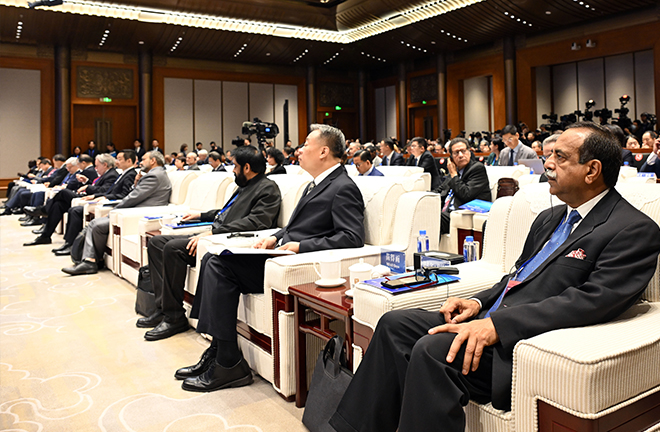Int’l forum calls for more democratic global governance

Attendees at the forum Photo: XINHUA
On March 20, more than 200 guests from various countries, regions, and international organizations convened in Beijing for the Third International Forum on Democracy: the Shared Human Values. The event was divided into four parallel forums: Democracy and Modern Governance, Democracy and the Rule of Law in the Digital Times, AI and the Future of Democracy, and Democracy and Global Governance in a Multipolar World.
Merit of Chinese democracy
At the opening ceremony, Wang Shaoguang, a professor emeritus at the Chinese University of Hong Kong, said that public participation in Western democracy emphasizes interaction between decision-makers and stakeholders, which determines that advantaged groups have stronger abilities to participate than the disadvantaged. This inequity in participation usually leads to unequal representation, further causing inequality in their respective influence.
In China, the mass line is a distinctive pathway to practice democracy, Wang noted. Decision-makers don’t await public participation to affect government decision-making. Instead, they originate from the people and take the initiative to interact with the people. Both deputies to the National People’s Congress and members of the Chinese People’s Political Consultative Conference are from among the people, as are leaders of different rankings.
Wang added that the mass line of Chinese democracy is conducive to absorbing public opinion and pooling the people’s wisdom to improve the decisions made by governments at all levels.
The merit of Chinese democracy was also recognized by Stephen Perry, president of the 48 Group Club in the United Kingdom, with more than 50 years of experience in exchanges and cooperation with China. He observed that the Communist Party of China, the Chinese government, and the Chinese people have found an effective joint decision-making model, asserting that China boasts a system and government that is better at incorporating the voice of the people.
In the contemporary multipolar world, Western democracy is not the sole or necessary model, said Hassan Ragab Hassan Abdrabo, a professor and director of the Confucius Institute at Suez Canal University in Egypt, who studied in China 30 years ago. The successful practice of Chinese democracy has fundamentally dispelled the notion that only Western democracy is true democracy.
Democracy in global governance
Attendees of the forum agreed that democracy is the right of the people in every country, rather than the prerogative of a few nations. They believe that respecting the diversity of world civilizations and other countries’ various approaches to democracy requires promoting democracy within global governance.
Alfred De Zayas, a professor from the Geneva School of Diplomacy in Switzerland, stressed that global governance and progress in democracy and peace hinge on the implementation of the UN Charter, but the democratic ideals championed by the West do not align with the expectations outlined in the charter.
Former Prime Minister of Italy Massimo D’Alema pointed out that deregulated globalization dominated by financial capitalism and free markets has suppressed the power of nation-states, highlighting the imperative to transition to a multipolar world.
Abhisit Vejjajiva, former prime minister of Thailand, asserted that the global governance system has never kept up with globalization. He underscored the urgency to rectify the imbalance, so as to make the world fairer and more democratic.
Hypocritical double-speak and double standards are detrimental to the development of democracy, said Ash Narain Roy, director of the Institute of Social Sciences in India. Hegemony and democracy are essentially incompatible, and building a fairer world necessitates the joint efforts of the Global South.
According to Hu Weixing, a professor and dean of the Faculty of Social Sciences at the University of Macau, the current combined GDP of Global South countries has risen from over 20% to more than 40% of global GDP. They are no longer poor, underdeveloped, and peripheral state groups, but represent an awakened force in the global arena.
Development and revitalization, along with fairness and justice, are common appeals of Global South countries, which are highly consistent with the vision and practice of building a human community with a shared future advocated by China, Hu said.
Democracy in digital age
Going forward, Kalyan Raj Sharma, chairman of the Nepal China Friendship Forum, remarked that as the digital revolution gives rise to digital democracy, challenges also arise. Phenomena like the ban on the social media platform Tik Tok out of democracy and security concerns indicate that arbitrary prohibition of apps is not the optimal way to solve problems. It is crucial to promote digital technologies as a force driving positive changes to democratic governance.
The manipulation of information via digital platforms by external forces has also affected democracy and the rule of law, posing threats to Kenya and China alike, said Dennis Munene Mwaniki, executive director of the China-Africa Center at the Africa Policy Institute in Kenya. He lauded China’s experience of empowering the youth to advance democracy and the rule of law in the digital era, thereby delivering voices with positive energy and building a more resilient democratic rule of law framework by better leveraging cyberspace.
Democracy is regarded as a shared human value and a common goal pursued by the international community. A consensus was reached at the forum to oppose hegemonism and power politics, to reject the weaponization of democracy, and to condemn the pursuit of hegemony by certain countries and groups under the guise of democracy.
(Zhang Yixin, Liu Yue, Chen Yajing, and Liu Yuanjian contributed to this story.)
Edited by CHEN MIRONG

 PRINT
PRINT CLOSE
CLOSE